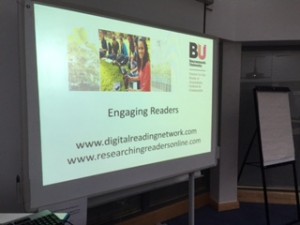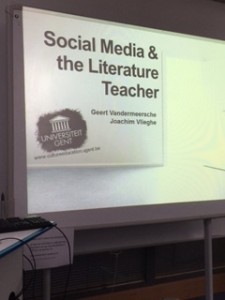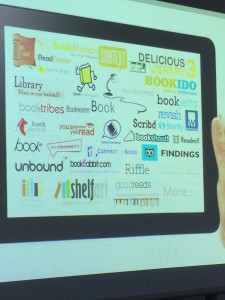The third of our workshops brought together scholars researching digital literacies with teachers and students from the locality to discuss what use might be made of digital platforms and social media in the classroom.
DRN members Joachim Vlieghe and Geert Vandermeersche from the University of Ghent outlined the ways in which the emergence of new platforms and digital tools is offering new opportunities for readers to engage with texts, other readers and authors. They reported on a study they conducted with trainee teachers using Goodreads, a popular book recommendation site with over 30 million members. This research has recently been published in the journal New Media and Society, and offers valuable insights into the potential pedagogical uses of such sites, while also recognising the strong misgivings teachers have about the kind of discussions and interactions that take place in such seemingly free environments. [A link to this paper can be found on our Resources tab]
In the discussion that followed, teachers from local schools and colleges commented that while they found such resources interesting and potentially valuable, the demands of delivering targets and rigidly teaching to the curriculum meant that in reality they had little time to explore or incorporate them into their classes. The discussion also focused on how sites such as Goodreads come and go, or are bought out and commercialised by large corporations, and how they might in fact mimic rather than offer an alternative to the ways in which literature is taught in the classroom.
BU colleagues Julian McDougall and Richard Berger then presented the findings of their AHRC funded project exploring videogames as ‘authorless literature’. The study, which involved lecturers and students on BA English at BU, set out to explore whether the skills typically developed by students of literature could be applied to videogames, with students turning the tables on their lecturers by teaching them how to play L.A. Noire. A study guide based on the project has been produced and is available to download at http://cedare-reports.co.uk/digitaltransformations/
Following Julian and Richard’s presentation, we reported briefly on the first of our projects to be funded, Researching Readers Online. This project involved an online survey of users of book-related online forums, followed by focus groups with students, local writers, librarians and members of local reading groups. The project was in part motivated by the desire to explore how teachers of literature might learn from the kinds of discussion and engagement taking place online, but the findings in fact challenged existing preconceptions about ‘digital natives’ and their reading habits and preferences.
The discussion then moved on to consider specific applications and uses of social media, for example students creating Twitter accounts for literary characters, or sharing their reading with others via sites such as Copia or SocialBook. We found that perhaps there was more freedom and time to experiment with these tools at university level, but current students and lecturers also expressed reservations about whether such activities would stimulate engagement if they were seen to be teacher- rather than student-led.
This was the penultimate event of the schedule we set out in our original funding bid. The final event will take place in early 2015 in London, bringing together publishers, writers, charities and public sector organisations to discuss the issues raised by research in this area. More details on this soon!


